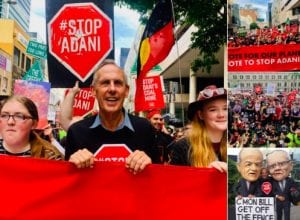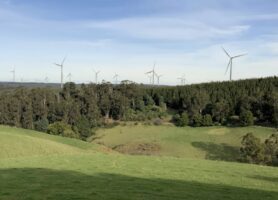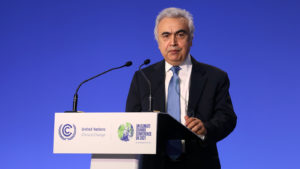The Australian Greens would introduce a guaranteed $50 per tonne floor price for “trusted and verified” carbon offsets units under a new policy designed to establish Australia as a net negative greenhouse gas emitter.
Australian Greens leader Adam Bandt unveiled the policy in an address to the Carbon Farming Industry Forum on Thursday, as part of a plan to fix the troubled Emissions Reduction Fund.
The Greens’ plan would see the federal government offer a guaranteed floor price of $50 per tonne for verified Australian Carbon Offset Units, a substantial premium above current open market prices.
Bandt told the forum – held just weeks out from the next federal election – that he saw carbon farming as creating the potential for emissions to be drawn down from the atmosphere, allowing Australia to go beyond a net zero target to become carbon negative.
“The Greens want to see carbon farming continue to expand past when we hit net zero, which we want to see happen by 2035,” Bandt said.
“That is why we want an Australian 2050 target of 100 million tonnes below net zero for each and every year until we return the planet to a safe climate.
“A single government desk purchasing abatement for $50 will encourage new supply so that we are ready to expand into a global market as soon as it arrives.
“This will separate out those companies that are dedicated to climate action and those that just want to greenwash their brands,” Bandt added.
Confidence in the Morrison government’s Emissions Reduction Fund has been rocked by claims – made by a carbon market expert previously responsible for oversight of the scheme’s integrity – that most of the carbon offsets issued under the scheme are not backed by genuine reductions in emissions.
The scheme is the flagship emissions reduction policy of the Morrison government, but it has seen its integrity challenged by suggestions carbon offsets are being awarded to projects that do little to achieve additional reductions in Australia’s emissions.
The Clean Energy Regulator, responsible for administrating the Emissions Reduction Fund, has defended the scheme, saying that its own analysis supports the view that Australia’s government-issued carbon offsets had strong environmental integrity.
The Greens have previously referred the operation of the Emissions Reduction Fund to the Commonwealth Auditor-General for investigation, following suggestions of potential fraud.
The market prices of ACCUs have also collapsed in recent weeks following the Morrison government effectively backing out of its intention to purchase emissions abatement using the fund.
But Bandt said that carbon farming still had the potential to play a positive role in reducing Australia’s emissions, provided the alleged flaws in the Emissions Reduction Fund were rectified.
“Instead of using carbon credits as a tool to bend down the carbon curve, the Liberals have been using them to cover up their ideological support for coal and gas,” Bandt said.
“The carbon farming industry will be a vital part of our plan to not just hit net zero emissions by 2035, but actively draw carbon from the atmosphere, undoing decades of damage from fossil fuels.”
“The opportunities for Australia to be a global provider of verified carbon credits are unparalleled by any other country. Our vast landscapes and skilled workforce are our huge competitive advantage,” Bandt added.
A recent report released by the Intergovernmental Panel on Climate Change concluded that a failure to cut emissions meant that being able to draw down emissions from the atmosphere would become increasingly necessary to achieve a goal of limiting global warming to below 1.5 degrees.
The Greens’ policy proposal was welcomed by the CEO of the Carbon Market Institute, John Connor, who said it had the potential to drive further investment in Australia’s emerging carbon markets.
“As we look to scale up this industry alongside the urgent and deep cuts required to industrial emissions, we need to be maximising benefits for regional communities, land managers and the environment,” Connor said.
“It is also important to see politicians begin to grapple with the reality that we need to build investment and integrity frameworks that not just help achieve net-zero emissions, but the negative emissions we will need for decades to return to a safer climate.”







